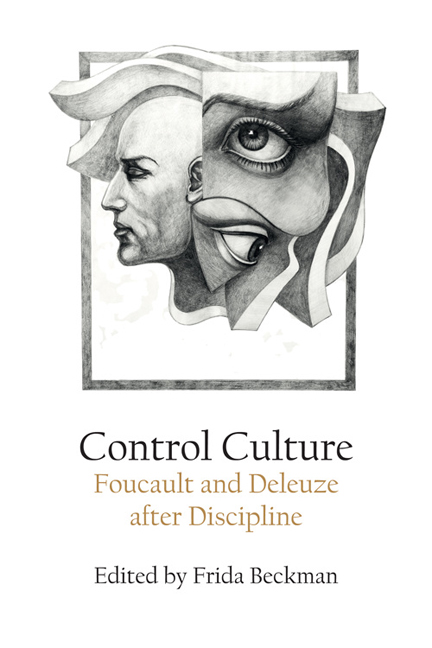Book contents
- Frontmatter
- Contents
- Acknowledgements
- Notes on Contributors
- Introduction. Control of What?
- 1 Notes from an Investigation of ‘Control Society’
- 2 Post-Mortem on Race and Control
- 3 Periodising (with) Control
- 4 Subjects of Sovereign Control and the Art of Critique in the Early Modern Period
- 5 Posthumanism, Social Complexity and the Political: A Genealogy for Foucault’s The Birth of Biopolitics
- 6 ‘That Path is for Your Steps Alone’: Popular Music, Neoliberalism and Biopolitics
- 7 Cinema in the Age of Control
- 8 Towards a ‘Minor’ Fascism: Panoptic Control and Resistant Multiplicity in TV’s Spooks
- 9 Species States: Animal Control in Phil Klay’s ‘Redeployment’
- 10 Control and a Minor Literature
- 11 Philosophy and Control
- Index
9 - Species States: Animal Control in Phil Klay’s ‘Redeployment’
Published online by Cambridge University Press: 05 May 2021
- Frontmatter
- Contents
- Acknowledgements
- Notes on Contributors
- Introduction. Control of What?
- 1 Notes from an Investigation of ‘Control Society’
- 2 Post-Mortem on Race and Control
- 3 Periodising (with) Control
- 4 Subjects of Sovereign Control and the Art of Critique in the Early Modern Period
- 5 Posthumanism, Social Complexity and the Political: A Genealogy for Foucault’s The Birth of Biopolitics
- 6 ‘That Path is for Your Steps Alone’: Popular Music, Neoliberalism and Biopolitics
- 7 Cinema in the Age of Control
- 8 Towards a ‘Minor’ Fascism: Panoptic Control and Resistant Multiplicity in TV’s Spooks
- 9 Species States: Animal Control in Phil Klay’s ‘Redeployment’
- 10 Control and a Minor Literature
- 11 Philosophy and Control
- Index
Summary
Cartoon animals are inescapable. With recent titles ranging from Penguins of Madagascar (2014), a spin-off from the Madagascar movies (2005, 2008, 2012), to The Secret Life of Pets (2016) and Zootopia (2016; in the UK, Zootropolis), they are everywhere. They are also inescapable in another sense. We cannot get away from cartoon animals, no matter how much we and they may want to go our separate ways: the movies revolve around animals trying to escape their human bondage. Likewise, the films depict humans abandoning their responsibilities to domesticated animals who then try to fend for themselves. Even in films that remain devoid of human characters, animal whereabouts are a key concern: investigating animal disappearances launches the career of a police bunny in Zootopia and helps her befriend an outlaw fox and recruit him for the police force. Whereas the key plot of previous pet movies such as Lassie Come Home (1943) revolved around the trauma of inadvertent separation and the triumph of reunion (a plot element that does persist in The Secret Life of Pets), the current movies have more in common with the genre of prison-break narratives. Celebrity-voiced cartoon creatures perform antics-with-an-attitude and recall Steve McQueen's cool. Only now and then do the escape movies venture towards the more gut-wrenching noir of The Shawshank Redemption (1994), for instance when we encounter a group of pets-rendered-refuse in the sewers of New York and get a very different appreciation of the dirty secret that makes up Life of Pets. One thing these cartoon creatures all understand is that they are dispensable – the abandoned pets but even the special ops Penguins of Madagascar share this knowledge, though their affective response differs and ranges from horror to an acceptance that verges on the nihilistic.
Current animated movies collectively seem like an elaborate pun on the notion of ‘animal control’, a word that euphemistically describes the life and death decisions municipalities make about the non-human creatures in their midst. What makes this pun all the more poignant is the fact that – even when a film overtly rejects human beings from inclusion in animal life-worlds – the movies rely on human beings in two ways.
- Type
- Chapter
- Information
- Control CultureFoucault and Deleuze after Discipline, pp. 166 - 179Publisher: Edinburgh University PressPrint publication year: 2018



